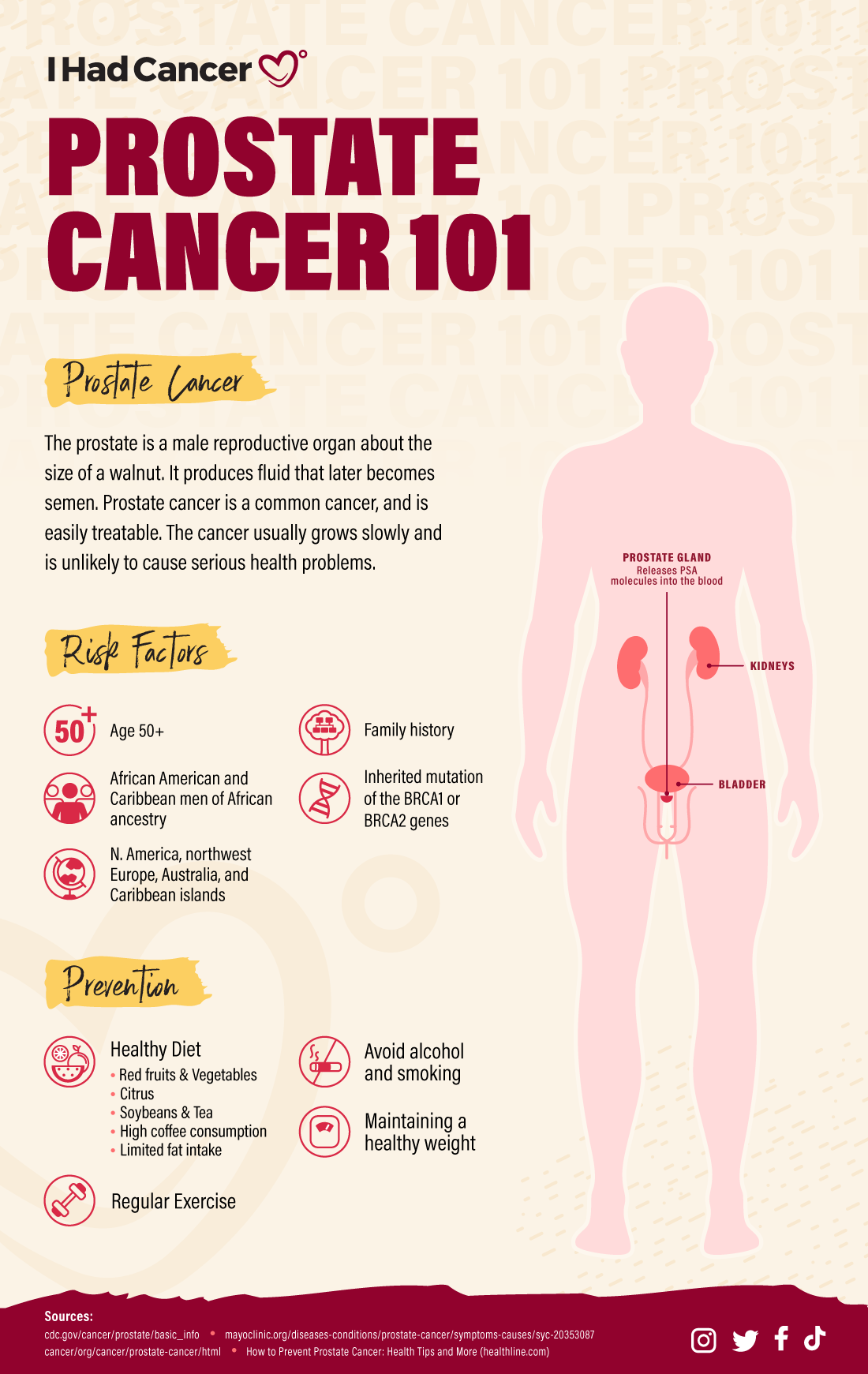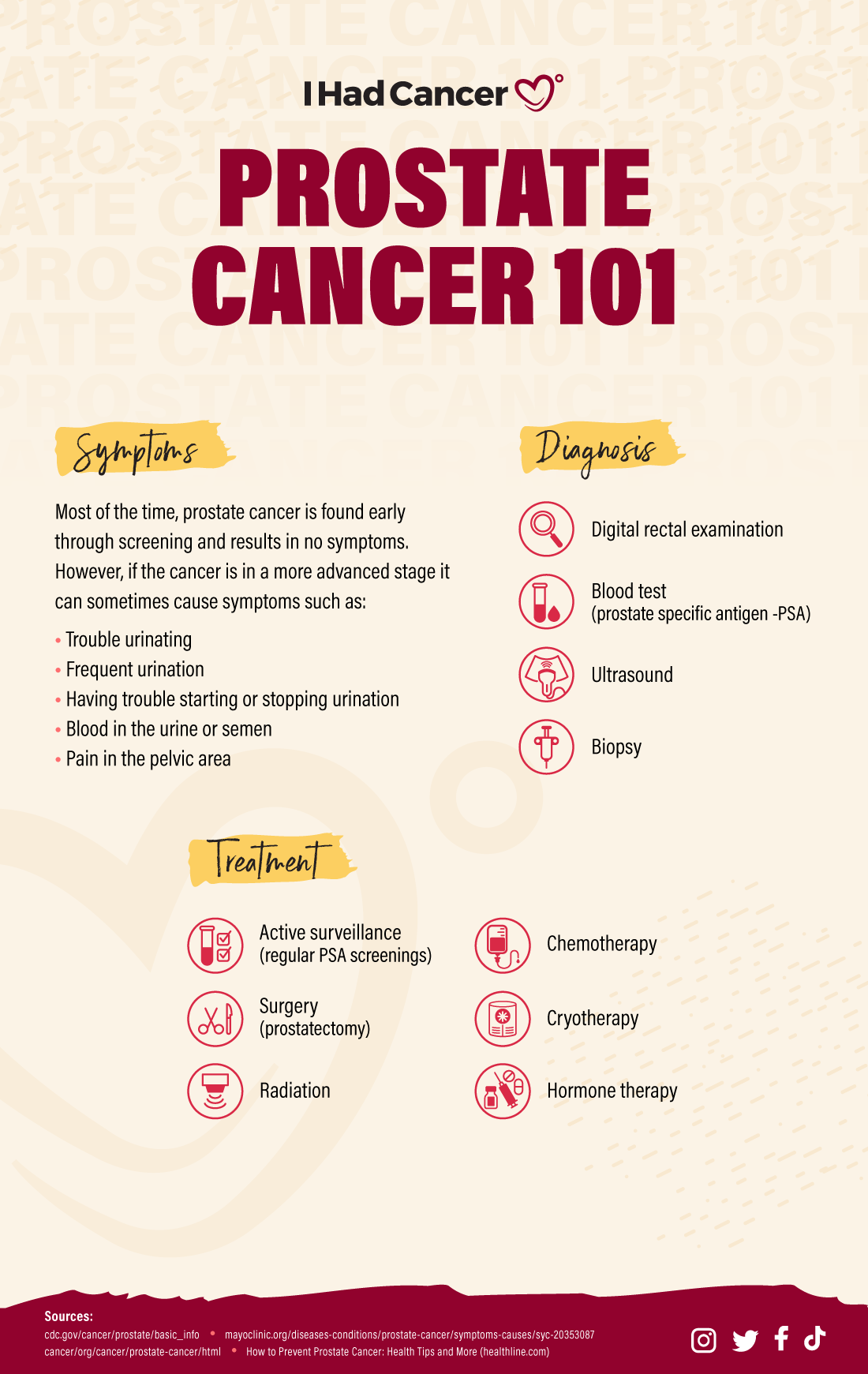Learn about different types of cancer through IHadCancer's "Cancer 101" series. Scroll down for information on Prostate Cancer & where to find support if you are a cancer thriver.
What is Prostate Cancer?
The prostate is a male reproductive organ about the size of a walnut. It is located just below the bladder and in front of the rectum. Its primary function is to produce a fluid that becomes part of semen. Prostate cancer occurs when cancerous cells within this region appear and multiply uncontrollably, causing tumors.
How is Prostate Cancer diagnosed?
Prostate Cancer is usually slow-growing, caused by tumors growing in the prostate gland. It is unlikely to cause serious health problems if diagnosed early. It is usually recommended that after the age of 55, prostate examinations should begin. These examinations can be done in any of the following ways:
- Digital Examination
- Blood Test for a prostate-specific antigen (PSA)
- Ultrasound
- Biopsy
What are some risk factors for Prostate Cancer?
- Being over the age of 50
- Being African American or Caribbean with African Ancestry
- Living in North America, Northwest Europe, Australia, or the Caribbean Islands
- Family history of cancer/prostate Cancer
- Genetics - Inherited mutation of the BRCA1 or BRCA2 genes
What are the best ways to prevent Prostate Cancer?
The best way to prevent prostate cancer is to maintain a healthy weight, as being overweight causes higher body insulin levels which can promote cancer cell growth. Other ways to prevent prostate cancer are:
- Eat a healthy diet, especially focusing on
- Red fruits, citrus, & vegetables
- Eating soybeans & drinking tea
- Increase coffee consumption
- Limit fat intake
- Exercise regularly
- Avoid alcohol & smoking
What are some symptoms of Prostate Cancer?
Most of the time, prostate cancer is detected early through regular screening and symptoms do not manifest before diagnosis. More advanced, untreated prostate cancer can cause symptoms such as:
- Trouble urinating
- Frequent urination
- Difficulty starting/stopping urination
- Blood in the urine or semen
- Pain in the pelvic area
What are typical treatments for Prostate Cancer?
Treatments for prostate cancer vary from patient to patient, but some of the most common ones are:
- Active Surveillance (Regular prostate-specific antigen screenings)
- Prostatectomy surgery
- Radiation
- Chemotherapy
- Cryotherapy (Use of extreme cold to freeze & remove cancerous tissue)
- Hormone therapy
Prostate Cancer Infographics
Click images for larger view and to download.
 |  |
IHadCancer Prostate Cancer Community Member Blogs:
1. Conquering Cancer: Survive To Thrive
2. I Was an Army Colonel for 20 Years And Prostate Cancer Was My Toughest Battle
3. Can The Right Attitude and Support Be Key In Achieving The Best Cancer Outcome?
4. If 'Wait and Watch' Is My Best Strategy, I Intend On Living And Enjoying Every Day As a Bonus
I'm a Prostate Cancer Fighter/Survivor/Thriver, and I need support. Where do I go?
Some organizations that provide financial and/or mental health support for the Prostate Cancer community are:
- Prostate Cancer Foundation
- Zero- the End of Prostate Cancer
- Sapphire Foundation for Prostate Cancer
- Yana - You are not alone now
Prostate Cancer Awareness:
September is Prostate Cancer Awareness Month and the color is light blue. Raise awareness by participating in local events and sharing your story. If you'd like to share your story on IHadCancer.com, email blog@ihadcancer.com.
References:
- mayoclinic.org/diseases-conditions/prostate-cancer/symptoms-causes/syc-20353087
- cancer/org/cancer/prostate-cancer/html
- healthline.com/health/9-tips-to-prevent-prostate-cancer








Team I Had Cancer is the group of people behind the scenes, making sure IHadCancer.com is running, and that you're connecting to the people you need to know for the support and information you need while dealing with cancer.